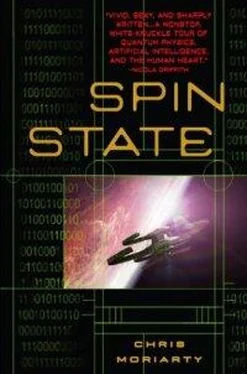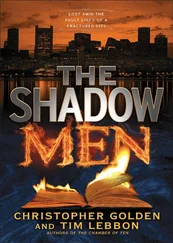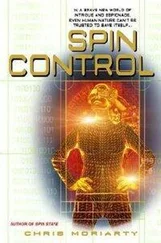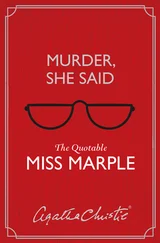“Yes I am. I can take care of this. And don’t eavesdrop!”
He cast a last look at Korchow, frowning. “You shouldn’t have anything to do with him, Catherine. He’s… well, he’s not nice.”
“Go home, Cohen.”
“Going,” he said. And then he did go, leaving a subtle whiff of hand-rolled cigars and extra-vielle behind him.
“Well,” Korchow said. “I think we understand each other.”
“What if I don’t show tonight?”
Korchow merely moved Bella’s fingers in answer, and the tattered yellow receipt reappeared, fluttering as if it had been caught by a stiff breeze. “That would be regrettable.”
Li looked at the thing in his hands and shivered. If that receipt ever ended up in front of the Service, they would check it out. They would have to. And when they checked, it would be over.
Fifteen years ago she’d had high confidence. The chop-shop geneticist hadn’t been much, but he’d been the best the meager payout on her father’s life insurance could buy; and his work, if not inspired, had at least been competent. Now, she knew its limits. Knew them in her gut with a wrenching certainty. She’d seen the gene work the best Ring-side labs could do, the work the Corps techs at Alba did. She’d slipped through the cracks this long only because there was no real proof—no proof damning enough to justify testing her. One fifteen-year-old scrap of paper could change that. And when it did, the whole crushing weight of the Security Council bureaucracy would fall on her like mine overload dropping into a collapsing tunnel. Losing her commission would be the least of it. She’d be lucky—or irretrievably indebted to Cohen’s high-priced lawyers—if she escaped without a prison sentence.
So what? She had other chances, other possibilities. It wasn’t all or nothing anymore. She had options.
But did she? What else was there for her, really? She loved her job. Was her job. Couldn’t imagine any other life. She thought about private security, about Cohen’s well-paid bodyguards. She remembered the high-tech muscle on the Calle Mexico.
No way. Not for her.
She sat on her rumpled bunk looking at the receipt, barely an arm’s length away from her, in the hands of a woman she had just made love to. And she knew she’d do anything, kill anyone, to get it.
All the worlds are there, even those in which everything goes wrong and all the statistical laws break down. The situation is no different from that which we face in ordinary statistical mechanics. If the initial conditions were right the universe-as-we-see-it could be a place in which heat sometimes flows from cold bodies to hot. We can perhaps argue that in those branches in which the universe makes a habit of misbehaving in this way, life fails to evolve; so no intelligent automata are around to be amazed by it.
—Bryce De Witt
Li made the meet early and scoped out the place—only sensible, since Korchow had chosen it.
She found it on the seedy outer fringe of what was euphemistically known as Shantytown’s entertainment district. This part of town looked right at night, somehow. It was less jarringly out of place when you couldn’t see the scrub hills and gypsum flats, or the bleak unterraformed wall of the Johannesburg Massif looming on the horizon.
It wasn’t raining in Shantytown, but it wasn’t not raining either. The water that dripped from the rooftops and doorways was part rain, part algae-laden condensation. It smelled sharp and fermented, and it wormed under Li’s collar and down her neck like prying fingers.
She was alone tonight. It hadn’t been easy to keep McCuen from coming, but it had been necessary. He could put things together far too quickly for comfort, and Saints knew what he’d do if he decided she was working for the Syndicates. Besides, if she was going to play the game Nguyen wanted her to play and still give Korchow enough to get that receipt from him, she was going to need some serious maneuvering room.
She checked her watch. Nearly an hour until the meet. Korchow’s man would arrive early too, of course. She aimed to be earlier still.
The bar was supposed to be called the Drift, but the only sign Li saw in the window was a flickering, fly-speckled halogen that looked like it must have read “$LOTS” before the L died. Still, this was the place Korchow had described: the narrow housefront sheathed in scaffolding, the bar entrance tucked between a peep show and a ComSat pay terminal, the drunks creaking up the rickety stairs to the second-story flophouse. She walked by, crossed the street half a block down, skirting around a poisonous mud puddle, and slipped under the jury-rigged arcade that shadowed the facing storefronts.
A loose panel rattled underfoot. Condensation dripped from mildewed girders and pooled on the walkway. She slipped into a darkened doorway, shook down a cigarette and lit it, masking its glowing tip with a cupped hand.
Korchow’s man arrived at twenty minutes of. There was no mistaking him; Syndicate birthlabs bred to an idealized pre-Migration genetic norm, and Li doubted anyone that close to human-looking had crossed the Drift’s threshold since the Riots.
She cursed Korchow for an overeager amateur. Then she saw his cool calculating professional’s face in her mind’s eye; whatever else he was, Korchow was no amateur. No, he wanted Sharifi’s data badly enough to blow the cover of an A Series operative. And he didn’t give a damn if Li got caught. He might even want her to get caught… down the line, when he had what he needed from her. She threw down her cigarette and heard it hiss in standing water as she stepped out of the shadows.
Inside, the Drift was less of a room than a haphazard string of loosely connected hallways. Li sidled through the initial bottleneck and dropped down an unmarked single step into what the regulars probably called the front room.
Korchow’s man sat halfway down the bar, hunched broodily over a beer. He looked up as Li came in, and their eyes met in the bar mirror. They’d done something to his face—broken the long narrow nose, blurred the lines of jaw and cheekbone—but they hadn’t been able to disguise the unnatural perfection of his features. He could have been Bella’s brother.
Li passed him by and took a seat toward the other end of the bar, back in the smeary half shadows beyond the cheap lighting panels. The bartender took her order without smiling, and the beer he brought her was flat and yeasty. She drank, eyes scanning the narrow room, and set the glass back down on a bartop still sticky with the faint rings of yesterday’s spilled beers. She was halfway through her second beer when Korchow’s man stood and walked past her into the back room.
“Where’s the bathroom?” Li asked a minute and a half later.
The bartender just gestured toward the back and muttered something that might have been “Left.”
There were tables in the back room, most of them empty. She threaded her way between them and pushed through a narrow door into a dim hallway that gave on the bathroom and the fire door. A surveillance camera blinked in an angle of wall and ceiling, but, as Korchow had promised, the little corner shelf screwed into the wall underneath it was just out of its field of view.
Korchow’s man came out of the toilet, coat slung over his arm. He squeezed between her and the shelf, mumbling an apology. She let him by, then went into the toilet herself. As she brushed past the shelf her hand slid across the datacube he had left there and palmed it.
She stepped through the door and scanned the narrow space. No cameras here—though there might be a voice-activated tap hidden in the wall. Even the camera out in the hall was probably no more than nonsentient-monitored company security. Still, why take chances? She went into the stall and sat down. She could feel the cube burning in her pocket. She turned it over, found the download switch by feel, and keyed it.
Читать дальше












